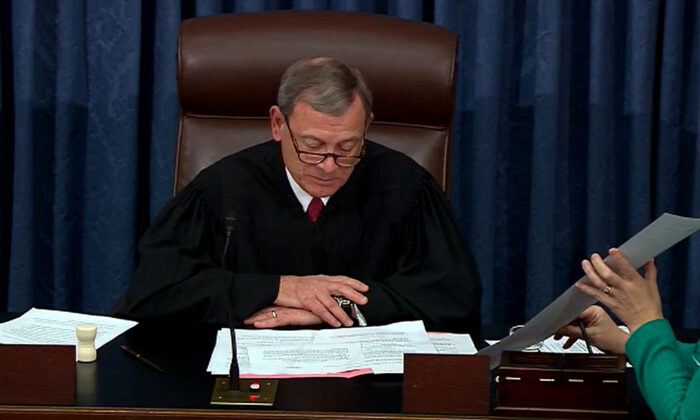Chief Justice John Roberts announces the results of the vote on the second article of impeachment during impeachment proceedings against President Donald Trump in the Senate at the Capitol in Washington on Feb. 5, 2020. (Senate Television via Getty Images)
Commentary
As if Americans didn’t have enough crises going on—the irrational COVID-19 panic, the rioting in the streets by the masked, pampered thugs of Antifa and pseudo-civil rights movement of Black Lives Matter, the widespread destruction of public and private property, the rejection of federal law by rogue “blue” states, and the assault on Western civilization in general—we have another one brewing in our legal system. This one may be the worst of all.
From John Roberts atop the Supreme Court in Washington to the lowliest federal judge in the land, madly contravening the lawful actions of the executive branch via nationwide injunctions, the jurisdictionally metastasizing judiciary has become obsessed with its own legitimacy and “legacy” and politicized beyond all reason. In its pettifogging, stare decisis (settled law) legalism, it has become a menace to the nation and the spirit in which it was founded.
This is what comes of the fetishization of “independence” in a country now so fractured emotionally and spiritually that its very survival is at stake. The American Constitution was written with a modicum of “checks and balances,” to be sure (although that language is nowhere to be found therein), but overall was intended to work as a harmonious whole in order serve the new nation—and not as three squabbling power centers vying for political supremacy. Which is why our elected officials swear to “preserve, protect, and defend” it against all enemies, foreign and domestic.
Far from working together, or even opposing each other within the historically delineated constitutional confines, the three branches are now openly at war with one another. The Congress, especially the House but with a sizable Senate contingent as well—hello, Mitt Romney! Ben Sasse!—despises the president, who, in turn, holds them in disdain.
And then there is the judiciary, starting with the Supreme Court, which apparently holds the entire American people in contempt, and doesn’t care who knows it. With the court essentially evenly divided between the lockstep liberals of Breyer, Ginsburg, Kagan, and Sotomayor on the one hand and Thomas, Alito, Kavanaugh, and Gorsuch/Roberts on the other, the United States is effectively ruled by the whim of one man: the swing vote.
Once upon a time that vote belonged to former Justice Anthony Kennedy, a Republican appointee who “grew” in office during his 30-year tenure and, as the deciding vote in the 2015 Obergefell decision, ordered every state to facilitate and recognize gay marriage in contravention of thousands of years of civil and religious history. His work done, Kennedy retired in 2018.
Latterly, the role of king of America has been played by the Chief Justice Roberts himself, with Associate Justice Neil Gorsuch taking over on Wednesday and Sunday matinee performances.
Consider two recent developments.
‘Significant Uncertainty’
First, McGirt v. Oklahoma, decided earlier this month, which finally made good on the promise of Rodgers and Hart’s song “Give It Back to the Indians” and in fact has given much of Oklahoma back to the displaced native tribes whose settlement of what was then known as “Indian Territory” was occasioned by Democrat President Andrew Jackson and his forcible displacement of the southeastern tribes along the Trail of Tears.
Ironically, the relocation of the Cherokee and the other four of the “Five Civilized Tribes” under Jackson’s Indian Removal Act of 1830 came despite a later ruling by the Supreme Court in Worcester v. Georgia (1832), which implicitly invalidated the Removal Act by arguing that the Indians retained political rights over their lands, and were answerable only to the federal government, not the states. Since the ruling had no direct effect on the White House, Jackson blithely ignored both it and the chief justice, John Marshall, the architect of Marbury v. Madison, the decision that lay the groundwork for the doctrine of judicial supremacy that has now morphed into tyranny.
In McGirt, the swing vote belonged to Gorsuch, Trump’s first appointee to the court in 2017. Incredibly, the neophyte justice overthrew not only centuries of settled custom (in war, to the victor go the spoils) but also tossed the territorial integrity of the United States into a cocked hat.
“On the far end of the Trail of Tears was a promise,” wrote Gorsuch in the majority opinion. “Forced to leave their ancestral lands in Georgia and Alabama, the Creek Nation received assurances that their new lands in the West would be secure forever.
“Today we are asked whether the land these treaties promised remains an Indian reservation for purposes of federal criminal law. Because Congress has not said otherwise, we hold the government to its word.”
If the country ever legally fractures, we can date its eventual dissolution to this ruling.
Roberts, the apostle of stare decisis was appalled: “The Court has profoundly destabilized the governance of eastern Oklahoma,” he wrote. “The decision today creates significant uncertainty for the State’s continuing authority over any area that touches Indian affairs, ranging from zoning and taxation to family and environmental law.”
Roberts and the other dissenting justices pointed out that the political sovereignty of the plaintiff Creek Nation was disestablished when Oklahoma became part of the Union in 1907, when the people of the Indian and Oklahoma territories voted in favor of admission. In his dissent, Clarence Thomas wrote: “The State of Oklahoma deserves more respect under our Constitution’s federal system.”
Just wait until France sues over the Louisiana Purchase, Russia over the sale of Alaska, or Mexico over the conquest of a huge swath of Mexican territory by the Americans in 1848.
‘Freedom to Play Craps’
The second case involved the Court’s unwillingness to hear the state of Nevada’s appeal of a Nevada federal court decision, Calvary Chapel v. Sisolak et al., which petitioned for the reopening of Nevada’s churches under the First Amendment in the face of Democrat Gov. Steve Sisolak’s order to allow casinos and other fleshpots to reopen in the face of the CCP virus “pandemic”—a scare word that means nothing more than “widespread,” but has no intimation of severity, lethality, or mortality—but not houses of worship.
The petition was rejected 5–4, with Roberts voting with the Democrats. This despite the plain language of the First Amendment, which states that “Congress shall make no law respecting an establishment of religion, or prohibiting the free exercise thereof.” Since the Bill of Rights has been “incorporated” into state constitutions via the due process clause of the 14th Amendment, this would appear to have been a slam dunk. But as Tammany Hall Democrat bigwig George Washington Plunkitt famously observed around the turn of the last century, “What’s the Constitution among friends?”
Writing for the minority, Justice Alito noted: “The Constitution guarantees the free exercise of religion. It says nothing about the freedom to play craps or blackjack, to feed tokens into a slot machine, or to engage in any other game of chance.”
Gorsuch added, “There is no world in which the Constitution permits Nevada to favor Caesars Palace over Calvary Chapel.”
Ah, but that’s the world we live in now—a place where a single, unelected, life-tenured judge can erase the free exercise clause from the Constitution without a word of public explanation. Yes, Roberts and the other eight justices had to go through the motions of considering the case and taking the obligatory 5–4 vote in order to give the charade a patina of legitimacy. And the four on the short end of the stick got to voice their outrage in a series of impotent dissents.
But since the only constitutionally mandated justice (chief) on the only constitutionally mandated court (Supreme) has effectively become the absolute monarch of the American Republic, Congress could save both time and money by abolishing the rest of the Court and letting Roberts rule alone.
He’d need a new title, of course, one befitting his exalted status, and besides, “chief” is no longer politically correct. Something historical that resonates absolute authority:
We could call him Caesar.


No comments:
Post a Comment